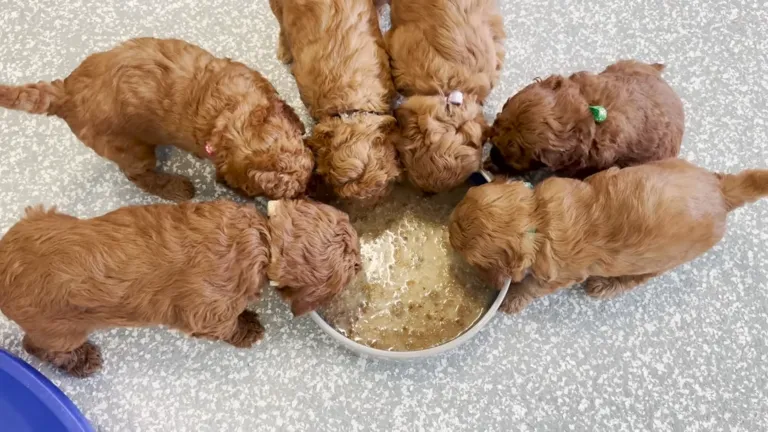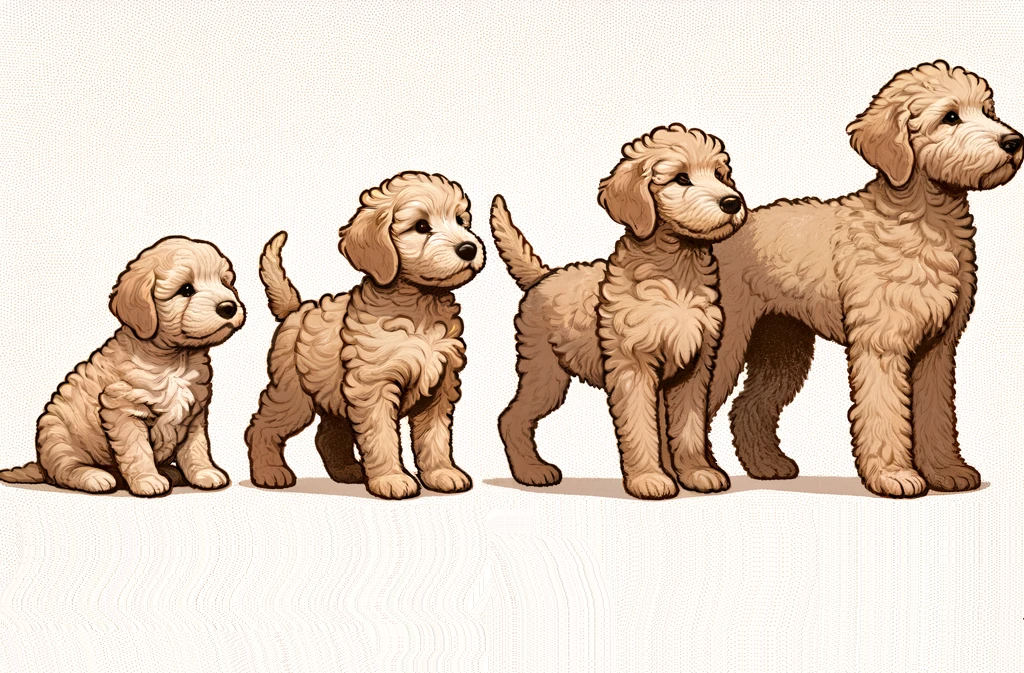Goldendoodle Behavior Stages [Managing Temperament]
If you are a dog parent then you must be aware of some of the common traits and characteristics of a Goldendoodle. However, a considerable percentage of dog breeders and owners claim that they do not find their Goldendoodle as they expected it to be. In some cases, I have seen people regretting their decision to adopt a Goldendoodle.
Before getting on to why there are mixed reviews in the market, let me present to you some of the general personality facts of a Goldendoodle.
Goldendoodle Demeanor and Personality Fact
Here is a quick overview of general perception or what character traits you should be expecting to find in your Goldendoodle:
- Sociable: They love making friends, both human and furry.
- Intelligent: Quick learners, they’ll probably outsmart you at times.
- Affectionate: Expect lots of cuddles and tail wags.
- Energetic: They’ve got more energy than a toddler on a sugar rush.
- Gentle: Their kind nature makes them great with kids.
- Adaptable: From apartments to farms, they’re happy anywhere.
- Loyal: Your shadow has nothing on a Goldendoodle’s loyalty.
- Playful: They believe life is a game – and they’re winning.
- Patient: They’re the Zen masters of the dog world.

But why on earth do some people find their Goldendoodle dumb, less energetic, and less playful and patient at some stages?
Well, here is the resolution. The intensity of some of these characteristics is gender-specific i.e. you may find a male Goldendoodle less energetic than a female Goldendoodle. It is also somewhat dependent on what a Goldendoodle eats. Some health complications of Goldendoodle may also cause unusual behavior.
But the real reason for this gap between expectations and reality is your lack of understanding about their brought-up stage that contributes to their personality development.
Like all human are not the same at different stages of their lives, so are the Goldendoodles. They tend to show their characteristics at different stages of their life span.
In the subsequent section, we will explore what are the behavioral stages of a Goldendoodle and how gradually they develop all the mentioned characteristics.
| Age Range | Stage Name | Key Characteristics |
|---|---|---|
| 0-2 Weeks | Neonatal Period | Nursing, cuddling, sleeping, limited sensory perception |
| 2-4 Weeks | Transition Period | Sensory development, beginning motor skills like walking, tail wagging |
| 4-8 Weeks | Toddler Stage | Exploring the environment, learning social skills, the importance of staying with litter |
| 7-12 Weeks | Socialization Stage | Exposure to different beings and environments, positive experiences crucial |
| 8-11 Weeks | First Fear Imprint | Development of fear responses, lasting impact of traumatic experiences |
| 12-16 Weeks | Pack Order Establishment | Understanding family hierarchy, testing boundaries |
| 4-8 Months | Flight Instinct Stage | Development of fear responses, the lasting impact of traumatic experiences |
| 7-10 Months | Adolescence | Testing limits, bursts of energy, playful and goofy behavior |
| 6-14 Months | Second Fear Stage | Possible resurgence of fear, subtlety in behavior changes |
| 1-3 Years | Adulthood | Fully grown; displaying protective behavior, establishing final pack order |
2-Weeks After Birth
The first 8 weeks of a Goldendoodle is the phase in which you are “setting the stage”. This is where all the difference is made in the lives of Goldendoodles. When the puppy is born.

Puppies are born with their eyes and ears sealed during the first two weeks of their lives. In this phase, Goldendoodles are a whirlwind of nursing, cuddling, and sleeping. Generally, it is crucial to handle any puppy during the “neonatal period”. To keep them calm, you should hold them in different positions and keep on tickling their body parts.
2 to 4 Weeks: Comming to Senses
This “transition period” marks a significant advance in sensory development and early motor abilities, including mastering walking, tail wagging, and starting to play with siblings.

4 to 8 Weeks: Toddler Stage
In the Toddler stage, doodle puppies start to explore beyond their litter. I term this phase as vital for their development.
I have seen that puppies that leave the litter too early often develop issues like excessive nervousness, barking, and even biting. You may disagree but that is what I have observed.

These problems arise because they miss essential lessons from their mother and siblings. Such early separation can lead to training challenges and persistent behavioral issues.
The Importance of Staying with the Litter
Puppies need to stay with their litter until at least 7-8 weeks of age. This is because they’d begin exploring their environment and learning crucial social skills.

Early removal from the litter can result in a puppy that is timid, or aggressive in behavior.
Do Goldendoodles Bark?
Yes, Goldendoodle bark but their barking is like “cute barking”. It can’t make someone very scared. Goldendoodles can bark more if removed early from their litter due to missed lessons in bite inhibition, understanding body language, vocalization, and establishing social relationships with other dogs.

Development Milestones
At 3 Weeks: Puppies learn bite inhibition, understand various postures, start vocalizing including barking, and begin establishing social relationships.
At 5 Weeks: Puppies learn dog manners, refine their interactions, and understand submission.
Mother’s Role in Teaching
Let’s not ignore the role of Mama Dog in this context. The mother plays a critical role in guiding, teaching, communicating, and redirecting the puppies.
She uses growls, snaps, or snarls for communication, teaching the puppies to understand and follow the pack’s rules. And you should be helping her to do so. Littermates also play a part, in helping each other learn clear signals of communication.

You may say that it’s a phase from where it starts learning social skills and etiquette in the dog’s kingdom.
7 to 12 Weeks: Socialization Stage
This stage is crucial for introducing your puppy to new dogs, humans, other species, and environments. This is an optimal time for positive development. It’s important to ensure that all experiences during this time are positive. This is the foundation for developing a happy, well-adjusted dog.

Goldendoodle Temperament at 7 Weeks
- Transition from mother’s to human-led education.
- High eagerness to please and learn.
- Emerging temperament traits and personality.
- Short attention spans.
- Behaviors learned now will carry into adulthood.
8 to 11 Weeks: First Fear Imprint Period
During this period, puppies are capable of experiencing true fear. Any traumatic, painful, or frightening experiences can have long-lasting effects.
Avoiding Negative Experiences
Here is what you need to do:
- Introduce new experiences, environments, and people gradually.
- Act as your puppy’s protector and confident leader.
- Provide a secure and comforting presence.
- Ensure all experiences are positive, using treats or toys.
- Protect your puppy from being pushed or handled forcefully by others.
- Avoid forcing your puppy into fearful situations. Simply, let them adjust at their own pace.
12 to 16 Weeks: Establishing the Pack Order
By now your Goldendoodle has become comfortable in your home and is closely observing the family dynamics. It’s learning about human behaviors and reactions, trying to understand his place in the family’s ‘pack.’
As it watches and learns, it will test its boundaries, seeing if it can climb the social ladder, starting from the ‘weaker’ members.
Developmental Challenges at 12-16 Weeks
- Easily overexcited.
- May growl or gently mouth you.
- Listening skills and obedience may lapse.
- Begins to question authority.
- Tries to assert his position in the family hierarchy.
- Might attempt to dominate or bite at leashes.
Useful Tips
Understanding your actions and body language is key to effectively communicating with your dog during this phase. Here is what you can do in this context:
- Stop playing if your puppy becomes overexcited or growls.
- Always supervise interactions between puppies and children.
- Enroll your puppy in a kindergarten class for socialization.
- Avoid games like tug-of-war to prevent aggressive behavior.
- Maintain consistent interaction and correction methods in the family.
- Say “no” and ignore your puppy if they bite, then redirect it to a toy.
- Show enthusiasm for good behavior but end plays if they bite.
- Consistently train your puppy at 3-6 months to understand pack dynamics.
- Support your puppy through the secondary fear period at 16 weeks with positive experiences.
4 to 8 Months: Flight Instinct Stage
Now your Goldendoodle will more likely show a strong desire to explore and may want to stray further from you.
Teaching them to stay close and respond to recall commands is essential during this period. Failing to establish these boundaries can lead to an adult dog that’s unreliable off-leash, potentially putting them in dangerous situations.
Developmental Changes from 4-8 Months
- Exhibiting increased independence.
- A previously clingy Goldendoodle may start venturing further away.
- Tendency to ignore commands.
- How you respond to their refusal to obey will impact their future off-leash reliability.
Training Tips for the Flight Instinct Stage
- Always keep your Goldendoodle on a leash in unsecured areas. Never let them roam free in an unconfined space!
- Enroll them in a training class that focuses on positive reinforcement techniques.
- Consistently work on reinforcing the recall command “come.”
- Ensure that recall is always associated with positive rewards.
7 to 10 Months: Adolescence
Ah, adolescence! This period can be a real test of patience for Goldendoodle parents. It’s often when your previously angelic Goldendoodle starts showing a more rebellious side.

Many families find this stage challenging and might even question their decision to bring a dog home.
But fear not, this is a natural phase, and with the right approach, you’ll both come out stronger!
Developmental Traits in Adolescence
- Your Goldendoodle may revisit defiant behaviors.
- There’s a challenge to the established family hierarchy.
- Expect sudden bursts of energy.
- Your doodle will be more exuberant and enthusiastic.
- They often become goofy, showing off their teeth in playful grins.
- This is also a time when they’re keen to learn new and fun activities.
Coping with Goldendoodle Adolescence Challenges
From my experience, this stage, while tricky, can also be quite endearing. Here’s what you can do:
- Reestablish the family’s pack order with your Goldendoodle.
- Embrace their goofy nature – it’s part of their charm!
- Dedicate time to ongoing training and positive learning experiences.
- Focus on reinforcing desirable behaviors.
- Try to ignore or redirect unwanted behaviors.
- Set realistic expectations – remember, they are still puppies in larger bodies.
- Continue with training classes and consider additional training opportunities to channel their energy positively.
6 to 14 Months: Second Fear Stage
Just when you thought you and your Goldendoodle had mastered confidence, a new challenge will emerge. Suddenly, your previously brave companion might startle at loud noises, hesitate to climb stairs or seem wary of car rides. It’s a normal part of their development, but it’s crucial to guide them through these fears. Teaching them to ‘shake it off and keep going’ is a life-long skill, reducing the risk of these fears becoming permanent.
Observations During This Phase
- Your once confident Goldendoodle may suddenly seem reluctant or fearful of new experiences.
- This stage can be quite subtle and may come and go throughout these months.
- The onset of this fear stage might seem random and not linked to any specific event.
- It can be a particularly frustrating time for owners.
- This behavior is often more noticeable in male Goldendoodles.
- Supporting Your Goldendoodle Through Fear Stages
- Patience and Positive Reinforcement

Supporting Your Goldendoodle Through Fear Stages
Having gone through this with my own Goldendoodle, I can say patience and understanding are key. Here’s what you can do:
- Avoid extreme reactions like anger, forcing, or excessive coddling.
- Be patient and observant of potential triggers in your Goldendoodle’s surroundings.
- Gradually desensitize them to fears with positive introductions and rewards.
- Refrain from reinforcing fear through too much reassurance.
- Avoid overreacting or harsh corrections.
- Celebrate their brave attempts with generous praise and rewards.
- Remember, your Goldendoodle will look to you for cues. You should stay calm and composed to help them feel secure.
1 to 3 Years: Embracing Adulthood
As your Goldendoodle enters adulthood, they’re no longer just a playful puppy but a full-fledged member of your family ‘pack.’ Hey! Hold on. You cannot treat them as a kid anymore.
They may start to see themselves as guardians of their home, which sounds appealing, but beware of letting them take this role too seriously.
You don’t want to end up under ‘royal’ rule, leading to potentially aggressive behaviors. Instead, think of your Goldendoodle as the family’s joyful court jester, which is safer and more enjoyable for everyone involved.
Developmental Traits in Adult Goldendoodles
- Increased territorial behavior.
- Strangers might be greeted with barking.
- They may bark at almost anything they find noteworthy.
- Playfulness with other dogs might turn into aggression.
- Possible confrontations with other dogs of the same sex.
- Testing the family hierarchy to see if they can advance.
Training and Managing Adult Goldendoodles
Having experienced some of these challenges with my own Goldendoodles, here’s what I’ve learned:
- Train your Goldendoodle on how to greet strangers properly.
- Encourage them to ignore dogs they don’t get along with.
- Reinforce good dog manners, especially around non-threatening dogs.
- Learn to interpret dog body language to anticipate aggressive behaviors.
- Ensure that your family maintains a clear and consistent pack order.
- Always reward positive behaviors.
- Engage your Goldendoodle in activities like therapy work, obedience, or agility classes to channel their energy productively.
Before I conclude the entire discussion, I would like you to take heed of an important matter that I personally experience: Separation Anxiety. As your Goldendoodle matures and forms deeper bonds with the family it’s essential to address this common concern among dog owners.
Addressing Separation Anxiety
Do Goldendoodles have separation anxiety? Yes, some do, especially if they become overly attached or aren’t given enough mental and physical stimulation.

This is what you may experience anytime during the first two years of your Goldendoodle.
To mitigate this, provide ample exercise, and mental stimulation, and practice leaving them alone for short periods, gradually increasing the time. Creating a safe and comfortable space for them when you’re away can also help ease their anxiety.
Key Takeaways
From the neonatal period to adulthood, each stage brings its unique challenges and joys. Goldendoodles are sociable, intelligent, and energetic, but they may display different temperaments based on gender, upbringing, and individual personality.
Key developmental stages include learning social skills from their litter, facing fear periods, and establishing pack order.
My personal experience underlines the importance of positive training, understanding body language, and managing behaviors like separation anxiety.
Remember, consistent training and understanding your Goldendoodle’s needs at each stage are essential for raising a well-adjusted, happy dog.

About Author
Sarah Brown is a Goldendoodle enthusiast. Her content makes the general audience aware of pet care, adoption, rescue, grooming, healthcare, and overall well-being. With a heart full of love and a mind rich with knowledge, she is the go-to guru for all things Goldendoodle.






